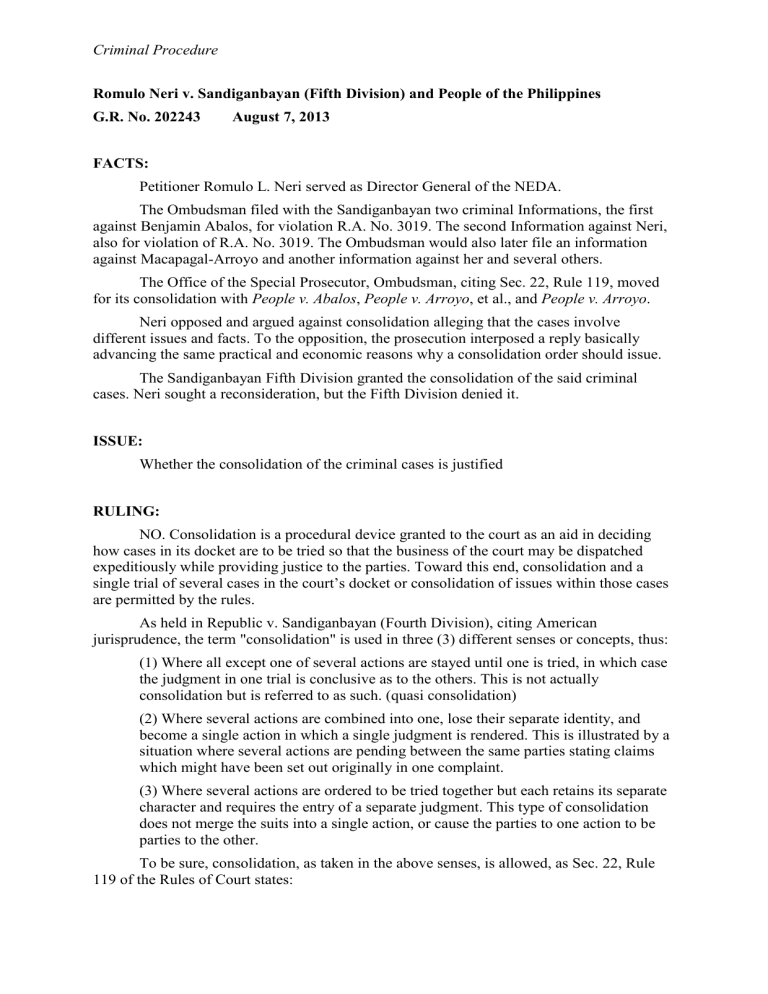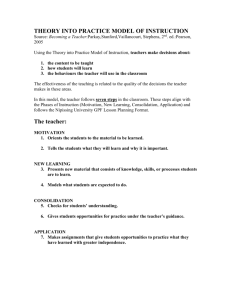111 Romulo Neri v. Sandiganbayan (Fifth Division) and People of the Philippines
advertisement

Criminal Procedure Romulo Neri v. Sandiganbayan (Fifth Division) and People of the Philippines G.R. No. 202243 August 7, 2013 FACTS: Petitioner Romulo L. Neri served as Director General of the NEDA. The Ombudsman filed with the Sandiganbayan two criminal Informations, the first against Benjamin Abalos, for violation R.A. No. 3019. The second Information against Neri, also for violation of R.A. No. 3019. The Ombudsman would also later file an information against Macapagal-Arroyo and another information against her and several others. The Office of the Special Prosecutor, Ombudsman, citing Sec. 22, Rule 119, moved for its consolidation with People v. Abalos, People v. Arroyo, et al., and People v. Arroyo. Neri opposed and argued against consolidation alleging that the cases involve different issues and facts. To the opposition, the prosecution interposed a reply basically advancing the same practical and economic reasons why a consolidation order should issue. The Sandiganbayan Fifth Division granted the consolidation of the said criminal cases. Neri sought a reconsideration, but the Fifth Division denied it. ISSUE: Whether the consolidation of the criminal cases is justified RULING: NO. Consolidation is a procedural device granted to the court as an aid in deciding how cases in its docket are to be tried so that the business of the court may be dispatched expeditiously while providing justice to the parties. Toward this end, consolidation and a single trial of several cases in the court’s docket or consolidation of issues within those cases are permitted by the rules. As held in Republic v. Sandiganbayan (Fourth Division), citing American jurisprudence, the term "consolidation" is used in three (3) different senses or concepts, thus: (1) Where all except one of several actions are stayed until one is tried, in which case the judgment in one trial is conclusive as to the others. This is not actually consolidation but is referred to as such. (quasi consolidation) (2) Where several actions are combined into one, lose their separate identity, and become a single action in which a single judgment is rendered. This is illustrated by a situation where several actions are pending between the same parties stating claims which might have been set out originally in one complaint. (3) Where several actions are ordered to be tried together but each retains its separate character and requires the entry of a separate judgment. This type of consolidation does not merge the suits into a single action, or cause the parties to one action to be parties to the other. To be sure, consolidation, as taken in the above senses, is allowed, as Sec. 22, Rule 119 of the Rules of Court states: Criminal Procedure Sec. 22. Consolidation of trials of related offenses. - Charges for offenses founded on the same facts or forming part of a series of offenses of similar character may be tried jointly at the discretion of the court. Consolidation could cut both ways.1âwphi1 It may expedite trial or it could cause delays. Cognizant of this dichotomy, the Court, in Dacanay v. People, stated the dictum that "the resulting inconvenience and expense on the part of the government cannot not be given preference over the right to a speedy trial and the protection of a person’s life, liberty or property." A consolidation of the Neri case to that of Abalos would expose petitioner Neri to testimonies which have no relation whatsoever in the case against him and the lengthening of the legal dispute thereby delaying the resolution of his case. And as in People v. Sandiganbayan, consolidation here would force petitioner to await the conclusion of testimonies against Abalos, however irrelevant or immaterial as to him (Neri) before the case against the latter may be resolved––a needless, hence, oppressive delay in the resolution of the criminal case against him.



